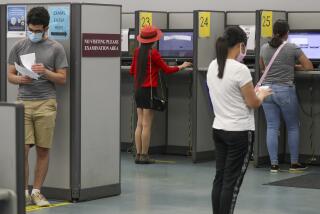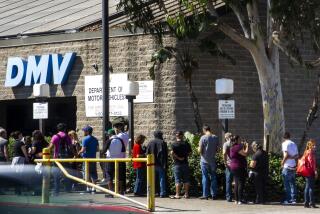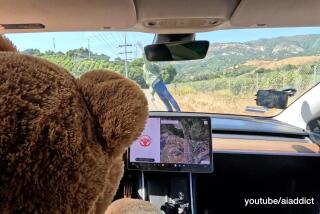Doing some drunk driving, stone cold sober

L.A. Times automotive reporter Charles Fleming tests his driving skills while wearing Ford’s drunk and drugged driving suits. The suits are used to educate teen drivers about the dangers of driving under the influence of alcohol or other drugs.
- Share via
Automobile accidents are the No. 1 cause of death among American teenagers.
Drunk and drugged driving are a big part of that. More than a third of all U.S. automotive fatalities involve alcohol, says the National Highway Transportation Safety Administration.
In California, 33% of 2014 automobile fatalities were alcohol-related, NHTSA said. In Texas, the figure was 44%. As cars have gotten safer because of things like air bags and automated braking, the percentage of all auto fatalities caused by or involving alcohol has gone up -- from a national average of 34.2% in 2003 to 38.6% a decade later.
Ford, through its Ford Motor Co. Fund, is trying to do something about that. For the last 12 years, its Ford Driving Skills for Life program has been educating teenage drivers about the dangers of impaired driving.
The program now includes drunk-driving goggles and a drugged-driving suit -- both of which are designed to simulate the physical symptoms of impaired driving in a person who is entirely sober.
On a cloudy weekday morning, on a rudimentary driving course set up on the roof of the Petersen Automotive Museum parking structure, I got a chance to do some drunk driving while sober.
First, I drove a few laps around the simple course, taking care to stay between the cones.
Then I was asked to put on the “drunk goggles” and drive the same course.
The goggles gave an immediate sensation of inebriation. Everything was out of focus. I was dizzy and off-balance. Just sitting behind the wheel, I felt nauseated.
Then I started driving. And I didn’t do very well. I clipped several cones and ran over several others, even while driving with one eye closed -- an old drunk-driving trick.
No matter how hard I tried, I couldn’t make the car go where I wanted. On the second lap, I ran over more cones than I had on the first. Even at careful, parking lot speed, I couldn’t function properly.
The driving course was designed to resemble the parking lot of a bar or nightclub, and the drive to resemble an inebriated person’s difficulties in getting on the road without incident.
In real life, I would have clipped a couple of cars. Or maybe run down a pedestrian.
Then, as if I had been pulled over by the authorities for driving under the influence, I put on the “drugged driving” suit and tried my hand at a field sobriety test.
The suit consisted of bindings around my elbows and knees, plus weights on my ankles and wrists. A pair of drugged-driving goggles added some flashing lights and eliminated most of my peripheral vision.
And the field sobriety test was hard! Any officer of the law would have immediately confirmed that I was not capable of driving safely, and clapped me in irons for a ride to the pokey.
The life lesson, according to Mike Speck, a former professional race car driver who now works with the Driving Skills for Life program, is to impress upon a sober teen how hard it is to drive impaired -- which they might not realize if they were trying to drive while they were snockered.
After the training, Speck said, “They realize, if they were drunk or high, they might not even be aware of being impaired.”
To date, the Driving Skills for Life program, which is not affiliated with school drivers’ training programs, has reached 800,000 drivers in 35 countries, including 41,000 U.S. teens.
This year’s program will visit 15 American cities in more than a dozen states and will include events in Fresno and San Diego. The half-day program is free and teenage drivers with licenses or learner’s permits are encouraged to attend with their parents or guardians.
For more information, visit Ford’s Driving Skills for Life website.
ALSO
Red Roof lets you know which hotels have the fastest WiFi
Celebrity cybersecurity consultants protect stars from hackers
TSA is tired of the wait too and wants new technology to speed up airport screenings
Follow me on Twitter @misterfleming







